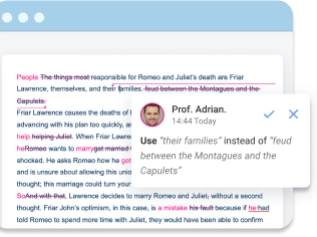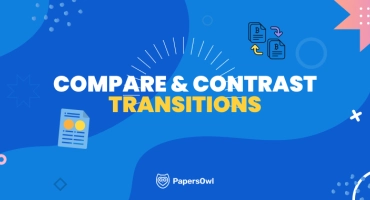Transition Words for Argumentative Essays and Their Role in Writing
Table of contents
- 1 Importance of Transition Words in Strengthening Arguments
- 2 Types of Transition Words and Phrases
- 3 Quick-Reference Table
- 4 Use of Transitional Phrases in Different Sections
- 5 List of Transition Words and Phrases
- 6 How to Effectively Use Transition Words?
- 7 How Do Transition Words Enhance Overall Academic Writing?
- 8 Summing Up
Transition words for argumentative essays are words and phrases that link ideas and give the writing a logical flow. They show readers how one thought leads to the next. Without them, even strong reasoning can feel broken or confusing!
PapersOwl’s essay writer experts note that transitions guide both writer and reader. They turn scattered concepts into a structured path. Each sentence gains direction, and the essay becomes easier to follow.
Good transitions do not decorate the text. They create order. They make your academic paper clear, persuasive, and competitive.
Importance of Transition Words in Strengthening Arguments
Strong arguments do not stand alone. They rely on persuasive words that connect them.
The words to use in an argumentative essay work like bridges, ensuring intelligibility and direction. Without them, one sentence might drift away from the next, breaking the rhythm of logic.
Transitions matter for more than grammar. They shape the importance of each concept, showing readers which ideas rise above others. Imagine explaining a process step by step — without these signals, the chain of statements would collapse, and writing could not follow the target.
Transitions are the bridge between ideas — don’t let your reader get lost!
Types of Transition Words and Phrases
Good transition words for argumentative essays act as signposts that guide a reader from one statement to the next. These help create logical bridges between paragraphs and sentences.
Some highlight comparison, others contrast, while some explain cause and effect. Their function is simple: to connect ideas smoothly. For example, when you need to show similarities or differences, you might rely on transition words for compare-contrast essays.
Common functions include:
- Comparison: likewise, correspondingly.
- Contrast: however, in contrast.
- Cause and effect: therefore, as a result.
- Adding ideas: moreover, in addition.
Clarification transitions help restate or explain ideas:
- In other words;
- To put it another way;
- That is to say;
- Namely.
These words make arguments clearer and prevent misinterpretation.
Transition Words for Introducing Ideas
Students often wonder, “What is a good sentence starter for an argumentative essay?” The answer lies in choosing single words or short expressions that signal the opening of a new idea.
A topic sentence framed with “to begin with,” “one key concept,” or “an initial reason” prepares the reader for the argument ahead!
Useful options for starting ideas:
- To begin with;
- An initial reason;
- One key concept;
- First of all;
- As a starting point.
Suggestion transitions propose actions or solutions:
- For this purpose;
- To this end;
- With this in mind.
These are useful in concluding or problem-solving paragraphs.
Transition Words for Building Arguments
Strong essays depend on clear links between claims. Good transitions for argumentative essays allow for presenting arguments in sequence without losing the reader.
Phrases such as “equally important” or “in the same way” demonstrate that another statement carries weight. Thus, writers often use “next” or “furthermore” to show progress.
Examples of such structures for building arguments:
- Next;
- Furthermore;
- In the same way;
- Likewise.
Sequence words organize arguments or steps:
- First;
- Second;
- Third;
- Next;
- Then;
- Finally;
- Subsequently.
They clarify the order of reasoning and ensure smooth claim progression.
Transition Words Used in Rebuttals and Counterclaims
Every essay benefits from acknowledging the other side. Counterclaim transition words help you shift to that discussion with clarity.
Terms like “on the contrary,” “nonetheless,” or “in spite of this” let you mark the opposing stance. Then, you can apply transition words for counterclaim and rebuttal, such as “however” or “yet” to respond.
Examples of good transition words for counterclaims:
- On the contrary;
- Nevertheless;
- In spite of this;
- However;
- Yet.
Transition Words for Conclusions
When an essay nears the end, conclusion transition words for argumentative essays bring closure.
Phrases such as “in summary,” “finally,” or “ultimately” guide the reader to the last statement. They allow you to conclude with confidence.
Examples of such constructions:
- In summary;
- Finally;
- Ultimately;
- To conclude;
- In the final analysis.

Quick-Reference Table
| Essay Part | Suggested Transition Phrases |
| Introduction | To begin with, Firstly, At the outset |
| First Body Paragraph | First and foremost, One key point is that… |
| Additional Body Points | Furthermore, Moreover, Additionally |
| Opposing Argument | On the other hand, Some argue that… |
| Rebuttal | However, Nevertheless, Despite this… |
| Conclusion | In conclusion, All in all, Ultimately |
Use of Transitional Phrases in Different Sections
They hold paragraphs together and keep the coherence steady. They show how one opinion leads to the next.
Such phrases help write college essay for me with clear steps. They immediately show order, contrast, and relationship between claims.
Introduction
The first sentence sets direction. Transitional words immediately guide readers toward one consideration and prepare them for the topic.
Good openings use small links between thoughts. They organize ideas and set the ground for further reasoning.
First Body Paragraph
The first paragraph should present the claim clearly. Transition words in an argumentative essay’s first body paragraph highlight the relationship between sentences.
Writers often similarly connect claims to maintain coherence. Examples make the link more persuasive and easier to follow.
Second Body Paragraph
The second paragraph expands on proof. Transition words for argumentative essays in the second body paragraph signal evidence and guide readers step by step.
Markers such as subsequently or likewise show order and connect findings. They prevent the discussion from sounding scattered.
Addressing Counterclaims and Rebuttals
Counterpoints need balance. Words like nonetheless and contrary keep the discussion clear without losing focus on the main claim.
Each sample of rebuttal shows a function in reasoning. Finally, the essay moves back to its central claim.
Counterarguments show you’ve considered multiple sides. Using phrases like:
- Although some may argue;
- It is often claimed that;
- On the other hand.
Use these to signal that you’re presenting an opposing viewpoint.
Rebuttals then respond clearly with:
- However;
- Nevertheless;
- Even so.
Why it matters: This distinction strengthens essays by demonstrating critical thinking.
Conclusion
The conclusion of an argumentative essay must tie all strands together. Final judgment shows how each idea contributed to the whole.
Ultimately, strong closing lines leave no doubt. All things considered, the essay should conclude with intelligibility and balance.
List of Transition Words and Phrases
Transition sentences and phrases work as bridges. They guide readers from one claim to the next without losing intelligibility.
Writers often rely on single words or short links. Each example builds sentences that flow and create a steady rhythm.
By Category
Logical connectors show the connection, manner, relationship, emphasis, and sequence between parts of an essay.
- Connection: moreover, furthermore, additionally, also, similarly essential
- Manner: in this way, by doing so, correspondingly, in such a way
- Relationship: in relation to, regarding, concerning, with respect to, as for
- Emphasis: above all, most importantly, notably, significantly, indeed
- Sequence: first, second, next, then, subsequently, finally
- Cause and Effect: therefore, thus, consequently, as a result, hence
- Contrast: however, on the other hand, nonetheless, nevertheless, yet, conversely
These markers keep reasoning ordered. They prevent sections from sounding like scattered notes.
Table of Common Transition Words
| Function | Transition Words | Example Sentence |
| Connection | moreover, furthermore, additionally, also, equally important, similarly, likewise, in addition, plus, together with, correspondingly, as well as, along with, in the same way, comparably | “Moreover, the telescope revealed unexpected patterns in the star cluster.” |
| Manner | in this way, by doing so, correspondingly, in such a way, in like manner, through this method, accordingly, as demonstrated by, in a similar fashion, in accordance with, following this procedure, in response to, by means of, in parallel, by extension | “By doing so, the soil retained moisture and improved crop yield.” |
| Relationship | in relation to, regarding, concerning, with respect to, as for, in reference to, pertaining to, about, in connection with, with regard to, in association with, relative to, compared with, in terms of, touching on | “In relation to previous studies, these findings suggest a new hypothesis for protein synthesis.” |
| Emphasis | above all, most importantly, notably, significantly, indeed, primarily, chiefly, especially, essentially, importantly, in particular, it should be noted, most notably, clearly, remarkably | “Notably, the revised formula enhanced precision in the chemical reaction.” |
| Sequence | first, second, third, next, then, subsequently, finally, ultimately, previously, thereafter, initially, following that, afterward, at this stage, in conclusion | “First, the sensors were calibrated. Subsequently, readings were taken over a 24-hour period.” |
| Cause and Effect | therefore, thus, consequently, as a result, hence, accordingly, for this reason, due to this, so, because of this, resulting in, under these circumstances, it follows that, in consequence, as an outcome | “Consequently, the ethical review board approved the experimental procedure.” |
| Contrast | however, on the other hand, nonetheless, nevertheless, yet, conversely, still, although, even so, in contrast, despite this, alternatively, rather, on the contrary, notwithstanding | “Even so, the control group remained unaffected by the intervention.” |
| Adding Ideas | in addition, moreover, furthermore, also, as well, plus, besides, not only that, equally important, along with, together with, coupled with, again, over and above, what’s more | “In addition, the indigenous farming technique improved soil fertility naturally.” |
| Examples | for example, for instance, such as, namely, particularly, specifically, as an illustration, to demonstrate, to illustrate, in particular, including, as shown by, consider, in one case, to give an example | “For instance, the experiment revealed a unique magnetic anomaly in the comet’s tail.” |
| Summary or Conclusion | In summary, to conclude, finally, ultimately, in conclusion, in the final analysis, to sum up, all things considered, overall, in brief, in short, to wrap up, as a final point, in essence, ultimately speaking | “In summary, the simulation confirmed the predicted gravitational waves.” |
Look at these short, relatable examples across various fields:
- STEM: “Consequently, the lab results confirmed the hypothesis.”
- Astrophysics: “On the other hand, the telescope’s data contradicted earlier models.”
- Agriculture: “In other words, crop rotation prevents soil depletion.”
- Aboriginal Culture: “Namely, storytelling preserves generational knowledge.”
- Bioethics: “Above all, patient consent remains a cornerstone of ethical practice.”
This shows versatility and helps readers see transitions in multiple contexts.
How to Effectively Use Transition Words?
An effective transition creates a smooth flow between sections of a paper. Without it, the discussion feels broken and unclear.
Writers use transitions to guide readers through analysis, ideas, and confirmation. Some phrases show comparison, others stress opposition. Used wisely, they make readers trust the order of thought.
Key roles:
- Mark the start of a new idea.
- Show comparison or contrast between claims.
- Maintain coherence in complex discussions.
- Help readers follow the analysis without confusion.
Practical Tips for Smooth Integration
Using transitions well strengthens plainness, flow, and claims. Follow these practical tips:
- Choose words for their purpose. Each transition has a logic: addition, contrast, example, or cause-and-effect. Use the right type. E.g.: “Therefore” signals cause-and-effect, not just addition.”
- Place transitions at key points. Begin new paragraphs or major points with a transition to guide the audience. E.g.: “In addition, the second test confirmed the initial hypothesis.”
- Vary your transitions. Avoid repeating the same word. Mix phrases for variety and rhythm. E.g.: Instead of using “also” repeatedly, alternate with “furthermore,” “moreover,” or “likewise.”
- Use transitions mid-sentence or at the end. They do not have to start every sentence. Placement can enhance structure. E.g.: “The crops matured early, therefore improving overall yield.”
- Limit quantity per paragraph. One or two well-placed transitions are usually enough. Overloading makes writing feel forced.
- Ensure logical fit. The transition must reflect the actual relationship between ideas. Misused words confuse the audience. E.g.: Do not use “however” to add a supporting point; it should indicate contrast.
- Integrate naturally into full sentences. Transitions should feel part of the text, not decorative or inserted abruptly. E.g.: “Moreover, the measurements aligned with previous simulations, confirming the trend.”

Common Mistakes to Avoid
Overuse can break sense and harm intelligibility. Adding a transition to every previous statement weakens the logic.
Some writers join two structures with needless markers. Others insert transitions in spite of clear structure. Both errors make the essay heavy.
| ❌ Mistake | 🤔 Why Is It a Problem | 💡 Better Example |
| Placing transitions where no link is needed | Creates confusion and slows reading | Wrong: “However, water boils at 100°C.” → Better: “Water boils at 100°C.” |
| Using the same marker in two sentences in a row | Repetition reduces impact | Wrong: “Moreover, the stars shine. Moreover, they emit heat.” → Better: “The stars shine, and moreover, they emit heat.” |
| Filling paragraphs with empty transitions | Weakens the sense and wastes space | Wrong: “Therefore, we can see it is clear.” → Better: “Therefore, the documentation shows a sharper decline in growth.” |
How Do Transition Words Enhance Overall Academic Writing?
Strong academic writing depends on intelligibility and order. Transition sentences easily carry the audience from one idea to another.
They shape the discussion and highlight the relationship between claims. With them, essays sound polished, structured, and persuasive.
Ways they enhance writing:
- Support logical progression of ideas.
- Mark the shift from one discussion point to the next.
- Strengthen the relationship between proof and claim.
- Help the audience see the essay as a whole.
Summing Up
Every essay needs a closing that does more than repeat. A strong conclusion ties strands of thought into one fabric. You show the thread of logic and remind the reader of key ideas.
Besides, the right transitions help you move from detail to insight. They prepare the ground for the last claim. Finally, you place the last piece of the puzzle. A clear end feels natural, not forced. In a brief summary, they give your essay the final push it needs to remain memorable!







